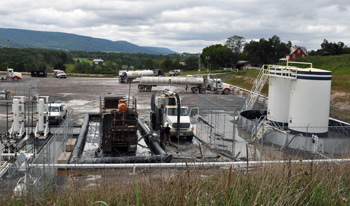Media
Facts Not Fear For Drilling Issue
 Below is my guest opinion published in the Lebanon Daily News today, which confronts a misleading letter to the editor addressing gas drilling.
Below is my guest opinion published in the Lebanon Daily News today, which confronts a misleading letter to the editor addressing gas drilling.
After reading Joyce Kunkle’s Dec. 6 letter titled “Look hard at shale drilling,” it is clear the real threat to Pennsylvanians isn’t posed by harnessing the great benefits of Marcellus Shale but by the mounting misinformation surrounding it.
While sharing her valid concerns for protection of our environment and the Pennsylvania Constitution, I challenge that facts, not fears, must rule the day lest this goose of economic freedom be strangled before laying its golden eggs.
While many of our citizens are just beginning to educate themselves on the issue, the Department of Environmental Protection and the many municipalities actually sitting atop this valuable resource have been intelligently anticipating its development.
Thankfully, unlike what was implied in the letter, the DEP oil and gas program is far from underfunded – in fact, it is now completely paid for by well-permit fees. Last year, the DEP increased permit fees from $100 to almost $6,000. This was a 1,600 percent increase in fees raising nearly $11 million to cover preparedness and inspections.
Kunkle further stokes fears when she cites this year’s drought, then links it to the removal of millions of gallons from state waterways for “fracking,” thus compounding “an already dire situation.” There are several errors in fact and logic with this line of thinking.
First, the DEP already requires with drilling applications a comprehensive water-management plan, which identifies exactly where and how much water can be withdrawn, thus ensuring consumption never exceeds supply.
Next, in respect to other industries, the quantity of water used for drilling is simply insignificant. According to the Susquehanna River Basin Commission, the gas industry uses about 2 million gallons of water per day from the Susquehanna watershed. In comparison, the recreation industry, such as ski resorts and golf clubs, uses 50 million gallons per day.
While a single Marcellus well takes about 3 million gallons of water to fracture, the majority of drilling companies are safely reusing the wastewater produced from hydraulic fracturing, thereby significantly reducing the amount of water used.
Kunkle then states, “The waste water is then hauled away and processed. Where to and how? Will they thoroughly treat the waste water? Many questions remain unanswered.”
Actually, those questions have been answered quite thoroughly.
As an additional safety measure, only specifically licensed treatment facilities can accept wastewater generated by drilling, and state law designates how “thoroughly treated” the wastewater must be before it re-enters waterways. In fact, effluent (water mixed with waste matter) produced from hydraulic fracturing is held to a higher standard than other industry effluents in the state.
Moreover, the letter implies Marcellus Shale development will contaminate Pennsylvania’s clean water supply and speculates it can put life as we know it into peril. Basic science begs to differ.
Since the 1950s, thousands of wells have been hydraulically fractured in Pennsylvania, and according to the DEP, the process has never led to groundwater contamination. This is because the laws of physics prevent fracking fluids from migrating upwards into aquifers.
Next, the letter insists legislators adopt a severance tax when they reconvene in January. This may be the most egregious notion of all.
When the prospect of Marcellus Shale first appeared, some politicians only saw one thing: A new revenue source to balance the state budget and fund a variety of special-interest projects. In fact, Pennsylvania House Democrats passed an unconstitutional severance-tax bill that would have made Pennsylvania the most heavily taxed natural-gas producing state in the nation. They intended to send 80 percent of the tax revenue to the general fund to continue Harrisburg’s tax-and-spend agenda, and much of the rest to a fund that gives grants to “green” corporations and organizations like enviro-lobbying groups – not for environmental protection.
Fortunately, after grassroots groups and researchers rallied to reveal the facts about gas drilling by demonstrating how the environment is being protected and how the social costs of drilling are more than paid for by the industry, the severance tax died.
May it rest in pieces.
Finally, the letter says, “we must see that the companies assume responsibility for drinking-water wells that become contaminated, not put the expensive burden of proof on the landowners.”
That’s a great notion, and I actually agree. Why? Because it is already the law.
Moving forward with Marcellus Shale development doesn’t mean Pennsylvanians should blindly accept drilling without insisting upon environmental protection and adherence to the law. Rather, if the light is to shine on the issue, we must all bear the torch with facts not fears.